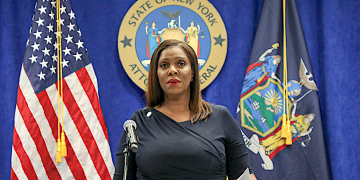When the New York State Department of Financial Services opened its doors Oct. 3, it quietly inherited a vast level of regulatory influence over the $3 trillion market for credit default swaps that has Wall Street as its unofficial home.
The newly formed department represents the merging of the state”™s Banking and Insurance departments with hopes of avoiding the mistakes and lack of oversight that led to the subprime mortgage crisis and subsequent recession.
The DFS will be broken into five divisions: insurance, banking, financial frauds and consumer protection, real estate finance and capital markets.
Joseph Pastore, professor emeritus and former dean of the Lubin School of Business at Pace University, said the move represents the state”™s response to the public”™s concerns over the largely unregulated derivatives market, which includes under its umbrella the market for credit default swaps.
“Credit default swaps have gone from essentially zero to about $3 trillion today, and that”™s the equivalent of Germany”™s GDP (gross domestic product),” Pastore said. “I think what we”™re seeing here is an increased concern on the part of public entities as it pertains to this very undefined area of derivatives.”
Leading up to 2007, Pastore said, lenders would sign off on large numbers of subprime mortgages and then look to have insurance companies such as American International Group Inc. guarantee the loans. Banks would then bundle packages of mortgages and sell them as packaged securities to the likes of Fannie Mae or Freddie Mac.
The problem, Pastore said, was that insurance companies would guarantee these packaged mortgages thinking the housing market was secure and stable, and as a result the insurers often didn”™t have the capital on hand to cover the mortgages in the event they defaulted.
“Had there been some oversight, there would have been mandates that AIG (and other insurers) would have had to meet.” Thus, Pastore said, came the DFS, which is “the next step in an effort to establish a closer connection ”“ at least in terms of regulatory oversight ”“ between the banking industry and the insurance industry.”
John Tolomer, president and CEO of The Westchester Bank, said it is too early for community banks such as his to know what the impact of the new department will be. He said that while the bank has regular conversations with state banking regulators and FDIC officials, he has not heard much information about any changes that are in store.
“I think the fear from a community banking perspective is that you lump in very large institutions and organizations and if you set guidelines and rules for the major corporations, how will that impact community banking and our ability to really serve local people and local businesses?” Tolomer said.
Pastore said he thought there may have been some political motivation behind the formation of the DFS. The department will be headed up by Benjamin Lawsky, a close confidant of Gov. Andrew Cuomo and a former federal prosecutor who has a reputation ”“ much like the New York attorney general”™s office ”“ for going after the big financial institutions.
“I think what”™s going on here is the governor wants to be closer to this issue,” Pastore said. “Organizationally, I think the state is hedging its own bets and making sure, at the risk of organizational redundancy, no one can claim they”™re not looking at these issues.”
















